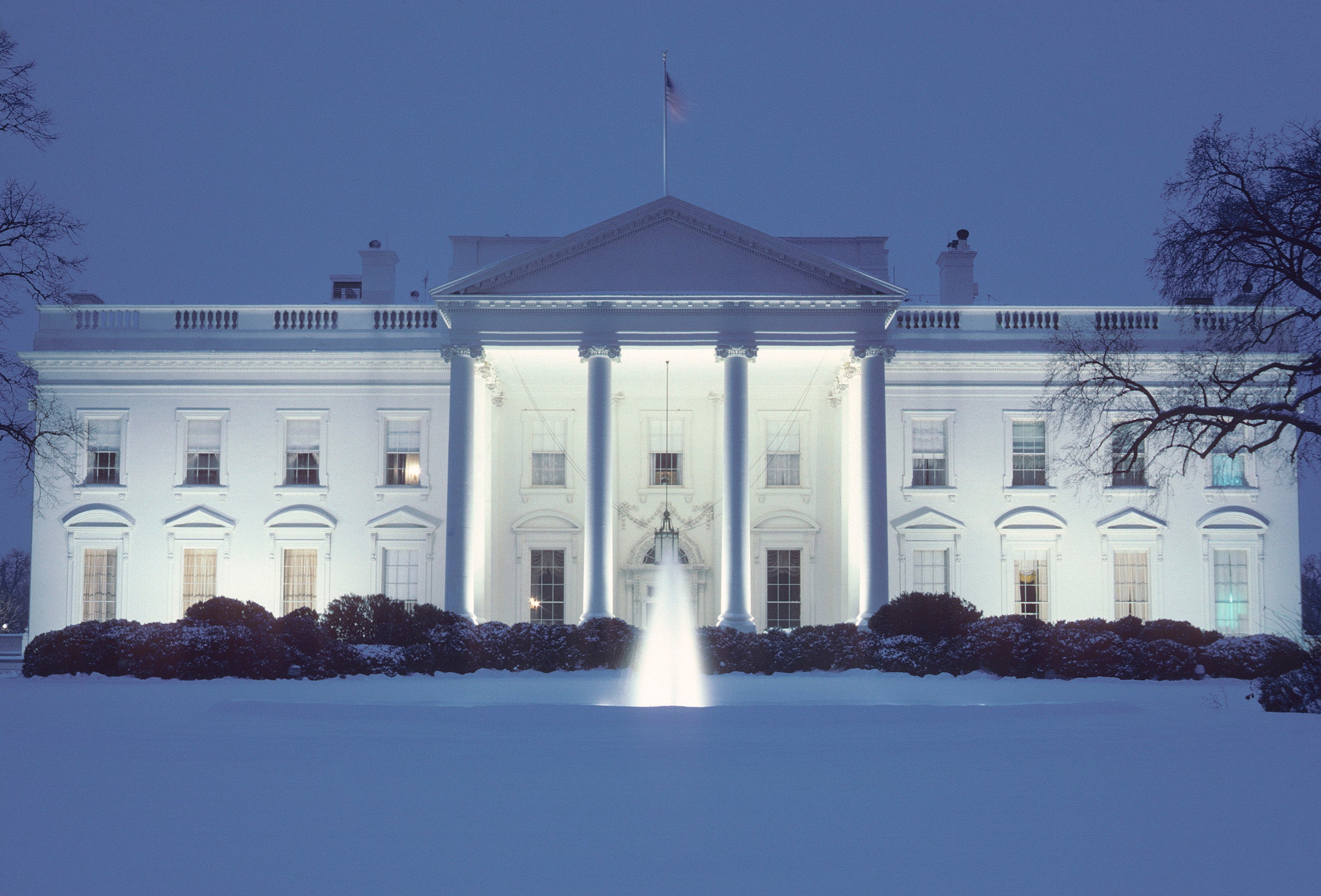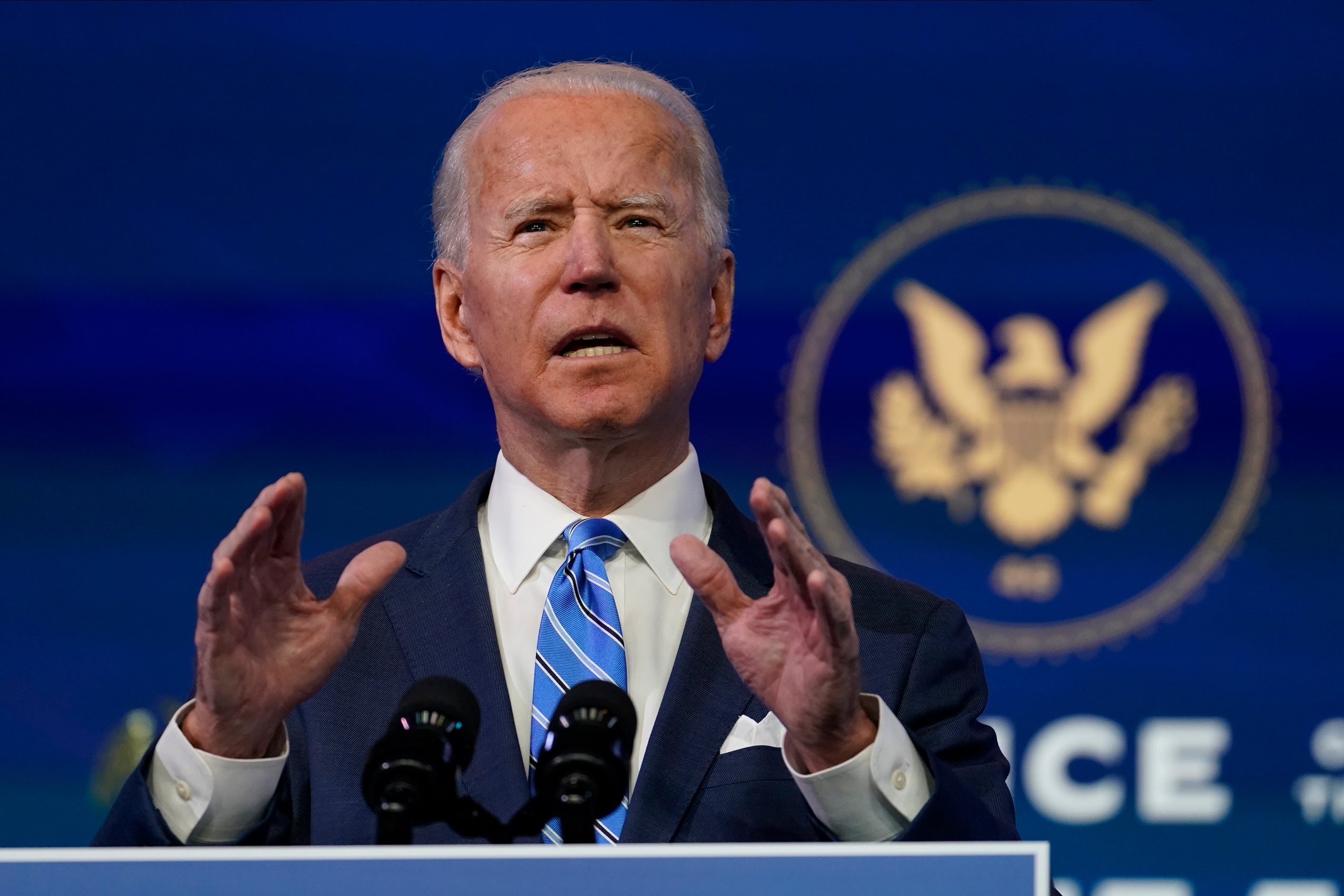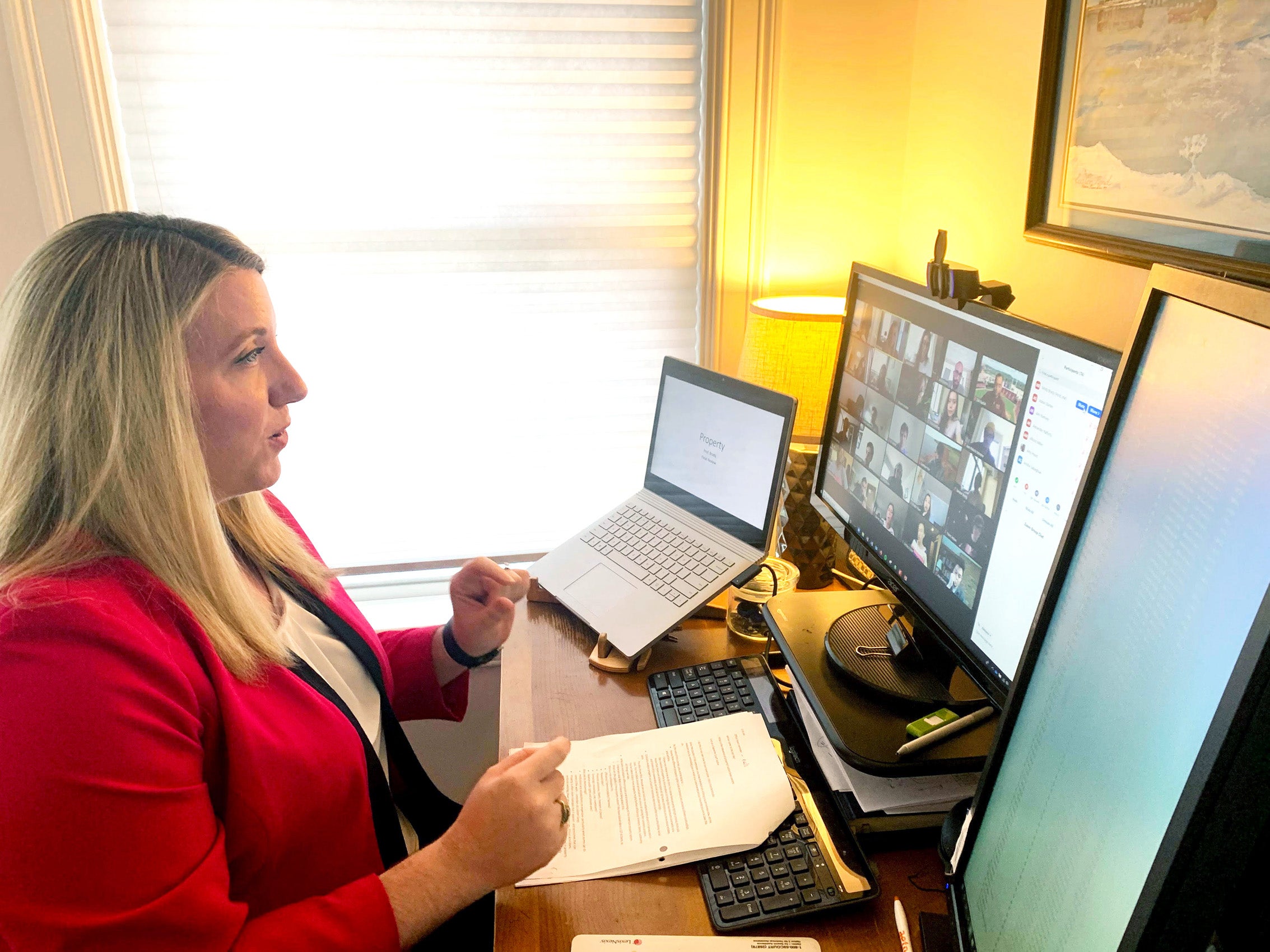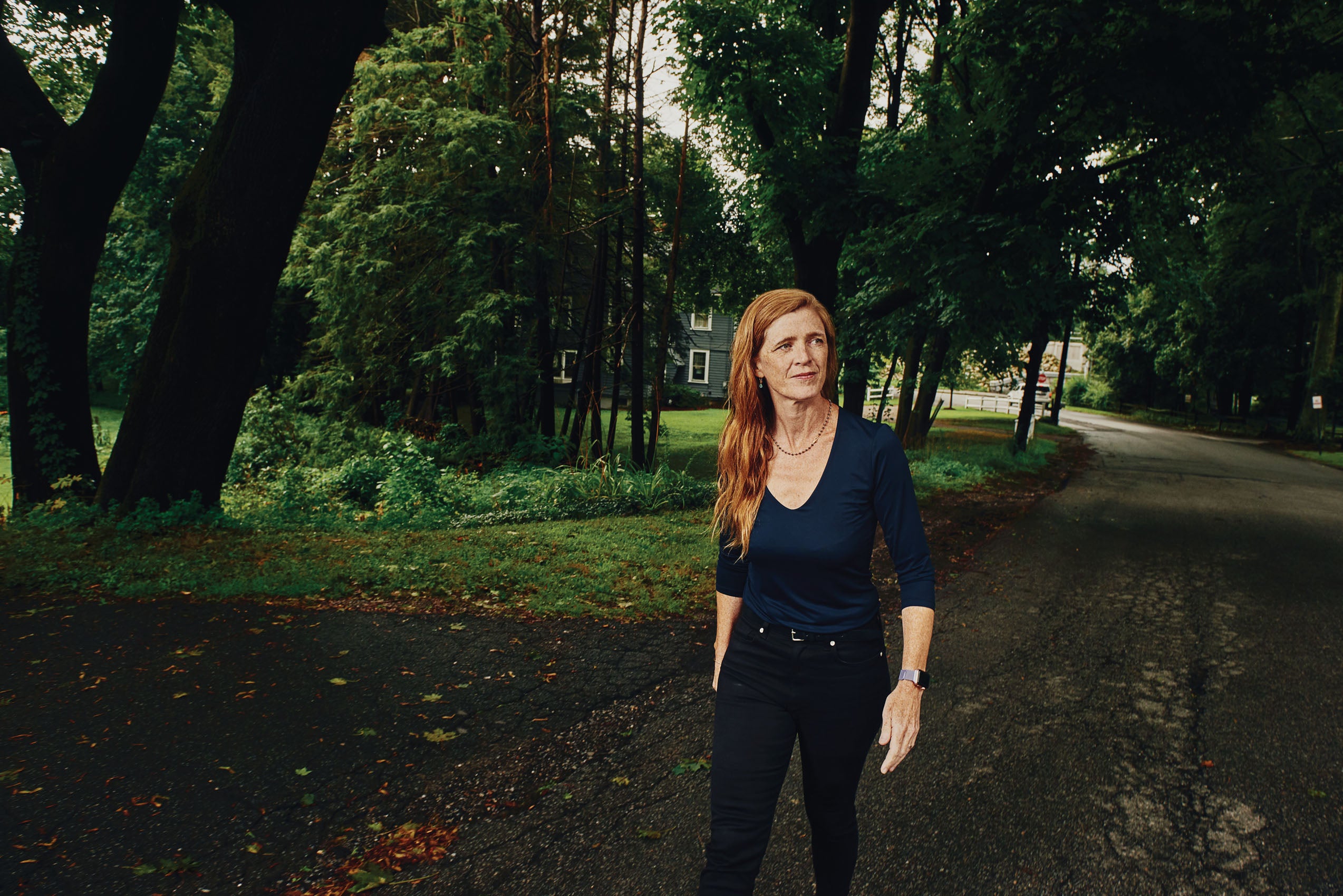People
Samantha Power
-
Presidential picks
January 19, 2021
Harvard Law Today has compiled the names of just a few of the HLS graduates who are expected to fill some of the most high-profile posts in the new Biden administration.
-
Women & Leadership Fireside Chat featuring Ambassador Samantha Power
December 17, 2020
The Boston Globe's CEO, Linda Henry, chats with Samantha Power, Professor of Practice at the Harvard Kennedy School and Harvard Law School and former U.S. Ambassador to the United Nations and a member of President Obama’s cabinet, for the second installment of The Boston Globe's Women and Leadership series.
-
The Can-Do Power
November 20, 2020
An op-ed by Samantha Power: Ever since then U.S. Secretary of State Madeleine Albright memorably called the United States “indispensable” more than two decades ago, both Americans and publics abroad have vigorously debated the proposition. Today, as President Donald Trump’s term comes to a close, foreign observers of the United States are more prone to use a different word: “incompetent.” The Trump administration’s response to the most urgent problem in the world today—the coronavirus pandemic—has been worse than that of any other nation. This, in turn, has understandably tarnished perceptions of the United States: according to recent Pew Research Center polling conducted in 13 major economic powers, a median of 84 percent of respondents agreed that the United States has done a poor job of handling COVID-19—by far the most damning appraisal received by any major country or institution. Yet the mishandling of the pandemic is just the latest in a string of lapses in basic competence that have called into question U.S. capabilities among both long-standing allies and countries whose partnership Washington may seek in the years to come. A brand once synonymous with the world-changing creations of Steve Jobs, with feats of strength and ingenuity such as the Berlin airlift and the moon landing, and with the opportunity represented by the Statue of Liberty now projects chaos, polarization, and dysfunction.
-
Samantha Power: ‘Putin was denied’ interfering in the 2020 election
November 19, 2020
Samantha Power, the former U.S. Ambassador to the UN, joins Lawrence O’Donnell to explain how foreign actors like Vladimir Putin were unable to “delegitimate the democratic process” through foreign interference in the 2020 election and why fired Trump admin. official Christopher Krebs “did such important work keeping the election straight.”
-
‘Find the People Who Actually Want to Do Things.’ Samantha Power Remembers the Wise Words of Jean Kennedy Smith
June 29, 2020
An article by Samantha Power: In 1944, two priests arrived at the Kennedy home to inform Joseph Kennedy Sr. and Rose Kennedy that their oldest son had been killed in World War II. Sixteen-year-old Jean, the eighth of their nine children, was devastated. After riding her bicycle to church to pray, she went next to the local hospital–to volunteer. Jean later recalled this as an obvious choice, asking, “What else could I do?” To spend time with Jean Kennedy Smith, who died on June 17 at 92, was to be bowled over by the sheer quantity of positive energy she brought to this world. When I saw her after I became U.S. ambassador to the U.N., she was firm (and wise) in her direction: “Don’t waste any time, and find the people who actually want to do things.” Conscious of her privilege, Jean dedicated much of her life to providing arts programming to children with disabilities. And whatever pain she carried inside, she projected a permanent twinkle and an eagerness to conspire. Her matchmaking gifts were legendary–she not only set up brothers John, Bobby and Teddy with their wives, but as ambassador to Ireland in the 1990s, she also convinced a skeptical Clinton Administration to work with shunned Sinn Féin president Gerry Adams. In so doing, she made a significant contribution to the 1998 Good Friday Agreement, which would end the deadly conflict in Northern Ireland. Asked how she’d like to be remembered, she evoked Abraham Lincoln: “I have planted a rose where only thistles grew.” Jean Kennedy Smith did that and so much more.
-
‘Deeply Unlawful’: Harvard Law School Faculty Condemn Trump’s Response to Police Brutality Protests
June 8, 2020
Members of the Harvard Law School faculty published an open letter to students and Harvard affiliates Monday criticizing President Donald J. Trump for calling for a military response to ongoing protests against police brutality. The letter received signatures from 160 faculty members, including former Law School Dean Martha L. Minow and former United States Ambassador to the United Nations Samantha J. Power. It was reopened for signatures on June 2 after requests from additional Law School teaching faculty and law librarians. The authors of the letter denounced a tweet posted by Trump on May 29 which included the phrase “when the looting starts, the shooting starts” in reference to nationwide protests following the killing of George Floyd by Minneapolis police. They argue the president’s language encourages violence by private citizens. “By legitimating lawless action by public officials, the President’s tweet invites other individuals to take similarly destructive action,” the letter reads. The White House press office did not immediately respond to a request for comment. Law School professor Christine A. Desan, who worked on drafting the letter, said Trump’s tweet signified a commitment to using violence against citizens involved in the protest. She said she finds the message problematic since Trump speaks as the Commander in Chief of the Army. “We don't under our Constitution live in a society where even if somebody is stealing something they get shot,” she said. “To have him pledge to use excessive state violence against people indiscriminately is really unlawful — deeply unlawful.”
-
How the COVID-19 Era Will Change National Security Forever
April 15, 2020
An article by Samantha Power: Speaking before the U.N. in 1987, President Ronald Reagan said, “Perhaps we need some outside universal threat to make us recognize [our] common bond. I occasionally think how quickly our differences worldwide would vanish if we were facing an alien threat from outside this world.” Reagan’s focus was avoiding conflict between countries rather than within them, but the coronavirus must do the work of that alien invader, inspiring cooperation both across borders and across the aisle. History shows us that seismic events have the potential to unite even politically divided Americans behind common cause. In the U.S., the COVID-19 pandemic has already taken more than seven times the number of lives as terrorists did in the 9/11 attacks, but the outpouring of solidarity Americans have shown for one another has so far not translated into more unity over government’s proper role at home or America’s proper role abroad. Indeed, the virus struck in an era of the most virulent polarization ever recorded—an unprecedented 82-percentage point divide between Republicans’ and Democrats’ average job-approval ratings of President Trump. And so far that gap appears only to be widening, while internationally, political leaders are trading recriminations rather than coordinating the procurement of medical supplies.
-
This Won’t End for Anyone Until It Ends for Everyone
April 8, 2020
An article by Samantha Power: Close to 370,000 infections and nearly 11,000 deaths in the United States. Nearly 10 million Americans filing unemployment claims. Unimaginable heartbreak and hardship, with worse to come. Given this still-developing emergency, and the fatal inadequacy of the U.S. government’s domestic preparedness and response so far, it is very hard to focus on the devastation that is about to strike the world’s poorest and most vulnerable. But if President Trump doesn’t overcome his go-it-alone mind-set and take immediate steps to mobilize a global coalition to combat the Covid-19 pandemic, its spread will cause a catastrophic loss of life and make it impossible to restore normalcy in the United States in the foreseeable future. Covid-19 is poised to tear through poor, displaced and conflict-affected communities around the world. Three billion people are unable to wash their hands at home, making it impossible to follow sanitation protocols. Because clinics in these communities have few or no gloves, masks, coronavirus tests, ventilators (the entire country of South Sudan has four) or ability to isolate infected patients, the contagion will be exponentially more lethal than in the developed countries it is currently ravaging.
-
The courage and compassion of Catholic activist Dorothy Day
March 10, 2020
A book review by Samantha Power: In September 2015, in my capacity as U.S. ambassador to the United Nations, I sat in the House chamber listening to Pope Francis deliver a joint address to Congress. In remarks that touched on religious fundamentalism, immigration and the death penalty, the pope said he intended “to dialogue” with Americans and their elected representatives. To do so, he drew on the lives of four national figures: Abraham Lincoln, Martin Luther King Jr., the Catholic Trappist monk and writer Thomas Merton, and “servant of God” Dorothy Day, whom the pope hailed for “her passion for justice and for the cause of the oppressed.” When I heard Day’s name, I looked around the chamber, wondering if anybody else was struck that he had included her.
-
Former UN ambassador Samantha Power shares personal experiences, professional perspective
February 28, 2020
Samantha Power never imagined she would write a memoir. But Power, who served as United Nations ambassador under President Obama, told a Harvard T.H. Chan School of Public Health audience on February 25, 2020 that she thought it was important to share her experiences—about being an immigrant from Ireland, her career, dealing with anxiety, romance, even baseball—and of what it was like trying to achieve major goals despite sometimes questioning her ability to do so. Speaking before a standing-room-only crowd in Kresge G1, Power said that she wished that more people—public officials, doctors, lawyers, or others—would open up more about what it’s like to try to improve the state of the world, because the process “is very shrouded from the outside. And that means you end up making all the mistakes the first time yourself. What I hope to do is spare people some of the many mistakes that I’ve made along the way.”
-
Samantha Power, a former U.S. ambassador to the United Nations, would tell you that one of the most pivotal moments of her career as a war reporter, diplomat, and Pulitzer Prize-winning author occurred during a baseball game between the Atlanta Braves and the San Francisco Giants. It was the summer of 1989, and Power had just wrapped up her first year at Yale and was working in the video booth at a CBS station in Atlanta. While taking notes on the game, she suddenly found herself engrossed in another screen depicting tanks rolling into Tiananmen Square. Up until that point, Power told an audience of more than seven hundred at Northeastern’s Boston campus Tuesday night, she had little interest in politics, and was considering a career in sports journalism. The Tiananmen Square protests changed all of that. “My epiphany was not ‘I’m going to one day be U.N. ambassador and be a human rights lawyer;’ it was nothing so grandiose,” Power said during an installment of Northeastern’s series, The Civic Experience. “It was simply maybe there’s more to life than sports.”
-
The Journey of an Idealist
January 7, 2020
Ambassador Samantha Power ’99 reflects on her life and career in her new memoir "The Education of an Idealist."
-
On the Bookshelf: HLS Authors
December 11, 2019
This fall, the Harvard Law School Library hosted a series of book talks by Harvard Law School authors on topics ranging from forgiveness in law, transparency in health and fidelity in constitutional practice.
-
‘Two terms of Donald Trump will not be twice the damage’: Samantha Power on her career – and life after Obama
November 10, 2019
“What I care above all about is ending the presidency of Donald Trump, not least because two terms of Donald Trump will not be twice the damage.” Irish-American woman Samantha Power, who served as a UN ambassador, has had a long and storied career. ... I don’t know what the exponent is, but probably five times, 10 times the damage, so it’s weird that four plus four is not eight.” Power went on to say she “just can’t even conceive of just the erosion of the rule of law and the corruption” under Trump. She said that it’s “so incredibly important that people rally” during the upcoming campaigns, adding that this election is “going to be all about turnout more than it’s going to be about persuasion”.
-
If Warren wins, former UN ambassador Samantha Power says she wouldn’t ‘rule out’ a run for her Senate seat
October 7, 2019
Former UN ambassador Samantha Power said Friday she would not rule out running for the US Senate seat held by Democratic Senator Elizabeth Warren, should Warren be elected president. Then again, she also said she wouldn’t rule out the job of Sox general manager, a job that’s actually open right now. Power, who lives in Concord, came to Providence Friday to promote her new memoir, “The Education of an Idealist.”
-
The Education of an Idealist: Samantha Power’s riveting insight into the Obama years
September 30, 2019
Diplomat, immigrant, journalist, mother. Samantha Power occupies many roles. Born in Dublin in 1970, she rose to become one of the most senior figures in the Obama administration, appointed US ambassador to the United Nations in 2013. She first emerged on the public scene with the publication of A Problem from Hell, a work inspired by her time as a war correspondent in the former Yugoslavia. The book is an intellectual tour de force, breathtaking in its analysis and argument, as it chronicles key episodes in 20th-century history exposing how the United States’ foreign-policy establishment stood by in the face of genocide. Although the book cemented her stardom – a young senator from Illinois called Barack Obama invited her to work for him after reading it – it also proved something of a poisoned chalice. Once she became a policymaker Power was bound to be scrutinised for her adherence, or otherwise, to the ideals she so passionately espoused in her book.
-
Running with Samantha Power
September 27, 2019
I SHOW UP at Samantha Power’s handsome clapboard house outside Concord, Massachusetts, a little after 8.30am, bleary-eyed and rather nervous. I have not merely arranged to interview Barack Obama’s former human-rights guru and ambassador to the UN. She has also suggested we run together. And having been up half the night reading Power’s doorstopper of a new memoir, a late arrival from its publisher, I am slightly dreading whatever workout she might have in mind. Almost as an aside in her book, “The Education of an Idealist”, she describes running the Boston marathon in her early 20s (for the first of several times). Her running mates wrote witty slogans on their T-shirts to draw shouts from the crowd. Fresh from a stint of war reporting in Bosnia, she wrote on hers: “Remember Srebrenica – 8,000 Bosnian Muslim men and boys murdered”. Power is not to be taken lightly.





